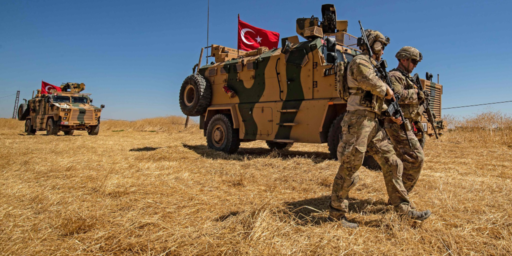Turkey Recalls Ambassador after House Genocide Resolution
The House has created a diplomatic incident by voting on a resolution labeling 90-year-old killings “genocide.”
Turkey has asked its ambassador in Washington to return to Turkey for consultations over a U.S. House panel’s approval of a bill describing the World War I-era mass killings of Armenians as genocide, a Foreign Ministry spokesman said Thursday. The ambassador would stay in Turkey for about a week or 10 days, said Foreign Ministry spokesman Levent Bilman. “We are not withdrawing our ambassador. We have asked him to come to Turkey for some consultations,” he said.
[…]
The House Foreign Affairs Committee passed the bill Wednesday despite intense lobbying by Turkish officials and opposition from President Bush. The vote was a triumph for well-organized Armenian-American interest groups who have lobbied Congress for decades to pass a resolution.
Defense Secretary Robert Gates reiterated his opposition to the resolution Thursday, saying the measure could hurt relations at a time when U.S. forces in Iraq rely heavily on Turkish permission to use their airspace for U.S. air cargo flights. Relations are already strained by accusations that the U.S. is unwilling to help Turkey fight Kurdish rebels based in northern Iraq. About 70 percent of U.S. air cargo headed for Iraq goes through Turkey, as does about one-third of the fuel used by the U.S. military in Iraq. U.S. bases also get water and other supplies by land from Turkish truckers who cross into the northern region of Iraqi Kurdistan.
Historians estimate up to 1.5 million Armenians were killed by Ottoman Turks around the time of World War I, an event widely viewed by genocide scholars as the first genocide of the 20th century. Turkey, however, denies the deaths constituted genocide, saying that the toll has been inflated and that those killed were victims of civil war and unrest.
The value to be gained by passing this resolution, beyond mollifying a small interest group, is non-existent. The potential harm to U.S. national security interests is substantially greater.
UPDATE: Dave Schuler expands on the costs:
Turkey is a member of NATO, bidding for EU membership, and, after Israel and the KSA, one of our closest allies in the Middle East, a region in which it’s not as though we had allies to burn. Turkey’s government has been quite secular for more than a century, which one would think is a quality to be cherished rather than spurned. Turkey has other bones to pick with us as well, in particular the use of Iraqi Kurdistan adjacent to Turkey as a base for incursions by Kurdish separatist guerrillas.
Steven Taylor questions the timing.
UPDATE: In a blogger conference call with Senator John McCain this afternoon, I had the opportunity to ask him about the Armenia resolution, especially in light of his comments in the last call about the need to put pressure on the government of Burma for human rights abuses. He agrees that this is “a tough one” and that there’s not much doubt that the incidents in question were “among the great genocides in human history.” At the same time, this happened generations ago and the current Turkish government is a great ally who we shouldn’t antagonize. He’d “like to find a way out of this one.”
The Burma situation is different because it’s ongoing. There’s no chance of the current Turkish government repeating the atrocities of the past; the Burmese government is doing it as we speak. “With all due respect to my friends in the House,” it would be more useful to focus on ongoing genocides rather than those of the distant past.





Timing and benefit aside, how can we complain about Ahmedinijad claiming there was no genocide in Germany in WW2, and then turn around and ask the USA not to admit that there was genocide in Armenia in WW1?
Nobody is asking the United States Government to deny that genocide took place. I’m just saying it shouldn’t grandstand in denouncing 90-year-old incidents in an attempt to embarrass an ally.
Dr. Joyner, you write, “The value to be gained by passing this resolution, beyond mollifying a small interest group, is non-existent.” That’s true only if one limits one’s analysis to practical value, and excludes moral ones.
Nonetheless, I end up agreeing with you because I don’t think that acting as a judge of moral values for people of other countries in their actions of nearly a century ago is an essential or even a proper role for our Congress. And by weighing in on a moral issue that is not essential to its actual responsibilities, Congress alienates the government and people of modern-day Turkey precisely when our relationship with them may be vital in preventing a modern-day genocide, one arising from certain worst-case scenarios flowing from the potential partition of Iraq.
Fact is there are resolutions on the Holocaust. Unless you are willing to say they are inappropriate this one is very appropriate as well.
You are also forgetting the important fact from researching the issue” this would not even be a question or an issue for congress if the government f Turkey hadn’t spent the last 10 to 15 years making such a big deal of denying it. They’ve jailed their academics internally and funded all kinds of denial outside of Turkey.
Seems that Ankara has made this an issue more than the remnants of the genocide survival.
Are Jewish groups who have US involvement in commemoration and recognition of the Holocaust, including taxpayer funding of museums, etc “a narrow interest group”? I don’t think so.
If this genocide had been properly and publicity recognized Hitler woudl have thought twice himself!
Sure. But I’d argue there’s no real moral value to be gained here, either, given the timeline. As McCain notes, this government isn’t culpable for the genocide that occurred 90 years ago.
That they’re reluctant to admit to it all these years later for cultural reasons I don’t quite understand speaks to something, I suppose. But what does it matter, really, other than to an ethnic minority holding on to ancient grudges?
The thing is, in reference to several objections above, it isn’t that the US is denying that something happened, it is simply a question of what to call it at this point. And while calling something genocide if it is ongoing has practical effects, what one calls an event almost 100 years in the past is all about symbolism.
I concur that the Turks are wrong to continue to downplay these events and they are especially wrong to imprison or censor anyone over this issue. However, there are still legitimate and practical reasons to avoid this confrontation right now.
Is it worth it to anger one of the largest and THE most democratic Muslim country just to pass the Armenian Genocide resolution, which has been passed twice already? Well, is it? http://www.youpolls.com/details.asp?pid=689